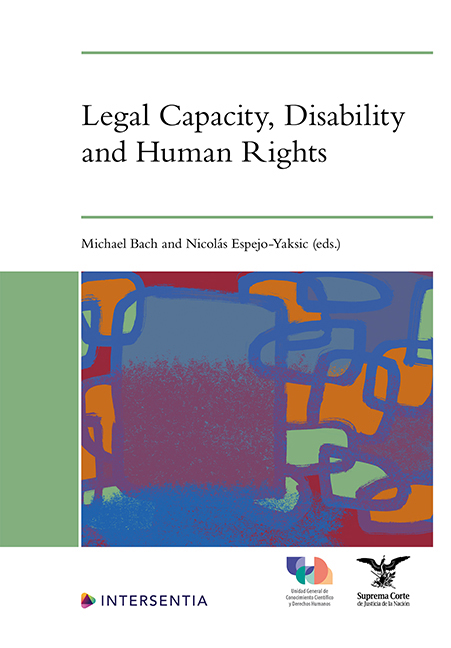Book contents
- Frontmatter
- Foreword
- Acknowledgements
- Contents
- List of Cases
- List of Contributors
- Legal Capacity, Disability and Human Rights: Introduction
- PART I HISTORICAL PERSPECTIVES AND THEORETICAL FRAMES
- PART II LAW REFORM: COUNTRY AND REGIONAL PERSPECTIVES
- PART III LEGAL QUESTIONS, PERSISTENT CHALLENGES
- Index
- About the Editors
Lessons from a Reformist Path to Supported Decision-Making in Australia
Published online by Cambridge University Press: 03 April 2024
- Frontmatter
- Foreword
- Acknowledgements
- Contents
- List of Cases
- List of Contributors
- Legal Capacity, Disability and Human Rights: Introduction
- PART I HISTORICAL PERSPECTIVES AND THEORETICAL FRAMES
- PART II LAW REFORM: COUNTRY AND REGIONAL PERSPECTIVES
- PART III LEGAL QUESTIONS, PERSISTENT CHALLENGES
- Index
- About the Editors
Summary
While Australia's moves in these legal fields have been rather slow, nevertheless in time most, if not all, jurisdictions will most likely adopt to varying degrees the paradigm change ushered in by article 12.
Ron McCallum AOAustralia has taken a gradual approach to reforming laws concerning legal capacity since the coming into force of the UN Convention on the Rights of Persons with Disabilities (CRPD) but an extensive one by global standards. Change has comprised statutory and non-statutory supported decisionmaking options, a growing body of conceptual and empirical research on the topic, and policy developments challenging the “best interests” principle behind longstanding substituted decision-making laws, policies and practices. Legislative reform has centred on guardianship and mental health laws but also criminal law, and other areas in which legal capacity has been – and, in some cases, continues to be – restricted for persons with disabilities, such as marriage, estate law and contract law.
Law reform has not extended to abandoning “substituted decision-making”. Guardianship and mental health laws appear likely to exist in some form for the foreseeable future, although the criteria for appointing a guardian or representative, or the imposition of involuntary psychiatric intervention, appears likely to narrow, with greater priority given to the actual and likely wishes of represented persons over the more paternalistic protection of their “best interests”. The duties of third parties to recognise legal capacity and adjust decision-making processes accordingly, also appear to be expanding, as do practical resources for individuals, families, supporters and service providers.
Australia can therefore be seen to have taken a reformist and incrementalist reform approach to legal capacity, equality and disability, but again one that is extensive by global standards. The breadth of change is somewhat paradoxical given Australia lacks a comprehensive legislative, administrative, or judicial framework for the protection of human rights, and given its interpretive declaration that restricts the scope of how Article 12 of the CRPD is to be applied, as discussed below. Australia's federalised system of government has seen reform initiatives and civil society activity concerning legal capacity vary between jurisdictions.
- Type
- Chapter
- Information
- Legal Capacity, Disability and Human Rights , pp. 255 - 276Publisher: IntersentiaPrint publication year: 2023



